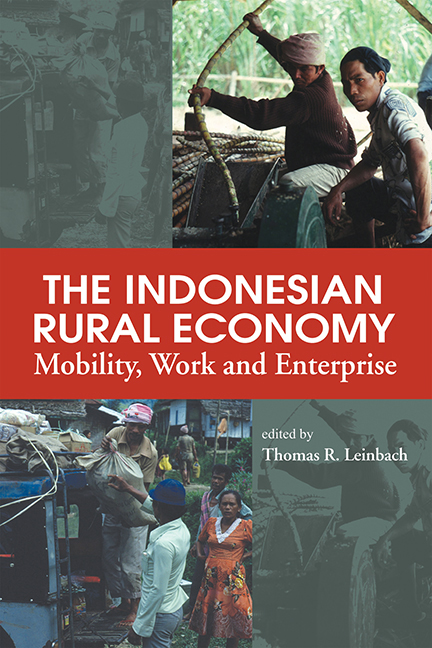Book contents
- Frontmatter
- Content
- List of Tables
- List of Figures
- Contributors
- Acknowledgements
- Glossary
- Foreword
- Part I The Development Context
- Part II Entrepreneurship, Gender and Mobility Issues
- Chapter 5 International Labour Migration and Rural Dynamics: A Study of Flores, East Nusa Tenggara
- Chapter 6 Gender, Socio-Spatial Networks, and Rural Non-Farm Work Among Migrants in West Java
- Chapter 7 Micro and Small-Scale Enterprises in Java: A Gender-Based Comparative Analysis of Entrepreneurial Behaviour and Performance of Enterprises
- Chapter 8 Migrant Entrepreneurs in East Indonesia
- Part III Indonesia's Rural Non-Farm Economy: Case Studies and Policy Development
- Index
Chapter 8 - Migrant Entrepreneurs in East Indonesia
from Part II - Entrepreneurship, Gender and Mobility Issues
Published online by Cambridge University Press: 21 October 2015
- Frontmatter
- Content
- List of Tables
- List of Figures
- Contributors
- Acknowledgements
- Glossary
- Foreword
- Part I The Development Context
- Part II Entrepreneurship, Gender and Mobility Issues
- Chapter 5 International Labour Migration and Rural Dynamics: A Study of Flores, East Nusa Tenggara
- Chapter 6 Gender, Socio-Spatial Networks, and Rural Non-Farm Work Among Migrants in West Java
- Chapter 7 Micro and Small-Scale Enterprises in Java: A Gender-Based Comparative Analysis of Entrepreneurial Behaviour and Performance of Enterprises
- Chapter 8 Migrant Entrepreneurs in East Indonesia
- Part III Indonesia's Rural Non-Farm Economy: Case Studies and Policy Development
- Index
Summary
Introduction
Self-employment has been an avenue for migrants to survive in their new environment. Like migrants elsewhere, migrants in the province of East Nusa Tenggara (located in the periphery of Indonesia) have shown a strong propensity to engage in self-employment. Although information on the migrants’ type of work is unavailable, it is presumed that, as with other regions in East Indonesia, the majority of the migrants in this region are included in self-employed activities (Manning and Rumbiak 1991). Selfemployment consists primarily of small businesses operated by the migrants possibly with the help of a limited number of workers.
In Indonesia the ethnical dimension in migration has always been important. Since 1998, it has become evident that ethnic and religious differences between migrants and the original population are a major source of tension in the various regions. These tensions are potentially significant when migrant entrepreneurs are faced with the decision of staying in business at the same location or leaving for a new destination. One of the objectives of this paper is to learn the role these ethnic tensions play compared with other location factors.
The engagement of the migrants in business activities is more prominent in urban than rural areas. Two explanations seem to be relevant for migrants’ entrepreneurial activities. The first explanation is provided by cultural theory (Jenkins 1984; Light 1984) which contends that the success of the migrants in entrepreneurial activities is due to the cultural endowments embedded in their original cultural tradition. According to this theory, the alien status of migrants has placed them in a marginalized situation, where they are prone to racial, ethnic, and religious discrimination from the host society (Auster and Aldrich 1984; Light 1979). This disadvantageous situation brings the migrants together, increases solidarity and cooperation among them, and eventually gives them an edge in competition with other groups. These practices have been found among the migrants in Irian Jaya (West Papua), who have utilized ethnic solidarity and ethnic resources to establish and manage small businesses (Manning and Rumbiak 1991). Business relationships are based on kinship and regional ties by which the migrants establish and coordinate their business.
- Type
- Chapter
- Information
- The Indonesian Rural EconomyMobility, Work and Enterprise, pp. 182 - 206Publisher: ISEAS–Yusof Ishak InstitutePrint publication year: 2003

